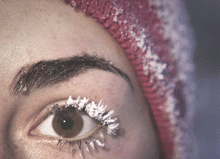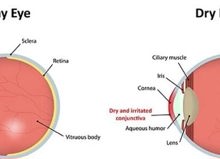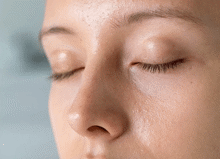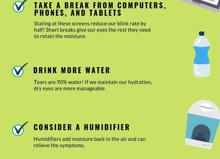What are dry eyes?
Dry eyes are caused by a problem with the production or quality of tears. Tears are important for the eye as they ensure it stays lubricated. When there is a problem with the production of tears, the eye can dry out, causing irritation, discomfort and inflammation.
Usually, dry eyes are not a cause for concern and can be effectively treated. However, the symptoms can be challenging to deal with in everyday life and severe cases they may affect your ability to do certain tasks.
The condition has many different causes and is extremely prevalent. With the increased use of screens for work and entertainment dry eyes are becoming increasingly common. Treating or preventing it effectively can make a big in preserving people’s quality of life and eye health.
If you experience persistent or recurrent dry eyes, it is a good idea to visit your optometrist. Beyond just managing your symptoms, treatment for dry eyes can minimise your risk of eye infection or damage to the surface of your eyes.
Types of dry eyes
The two main types of dry eyes are caused by either the eye not producing enough tears or the tears evaporating too quickly. The medical terms for these types are aqueous tear-deficient (ATD) dry eyes and evaporative dry eyes.
Aqueous tear-deficient dry eye occurs when the lacrimal gland does not produce enough tears. Tears are used to lubricate, so when there aren’t enough of them the surface dries out. This can cause friction when you blink, leading to discomfort and sometimes inflammation.
Evaporative dry eye is more common and accounts for 85% of cases (Findlay and Reid, 2018). Tears have an oily outer layer and this helps to prevent them from evaporating too quickly. With evaporative dry eye not enough of this oily substance is present and this leads to tears evaporating too quickly.
Symptoms tend to be similar in both types of dry eyes, but each case is different and you may experience the condition differently from someone else.
Diagnosis of dry eyes
Dry eyes can be diagnosed during a comprehensive eye exam.
This will include some questions about your symptoms and health status. Certain medications, environmental factors and other health conditions can be the cause of dry eyes, so understanding your unique case will help your optometrist to make an accurate recommendation.
During the examination, they will look for signs of dry eyes, like inflammation or redness. They will also carry out specific tests to determine whether you are producing enough tears, how quickly they are evaporating and whether the quality of your tears may be causing your symptoms.

Causes of dry eyes
Dry eyes may be caused by something in your environment, certain types of medication or an underlying condition.
Environmental factors include:
- Climate: dry or windy conditions can cause increased tear evaporation.
- Smoke and pollution: this can come from smoking cigarettes or regularly being exposed to high levels of pollution or burning materials.
- Screen time: because we blink less while using screens, our eyes are more likely to become dry and irritated.
- Loss of sleep: for various reasons, some people’s eyes dry out while they sleep.
Many medications may cause dry eyes. Some of the most common are:
- Antihistamines
- Antidepressants
- Contraceptive medication
- Acne medications
- Beta-blockers (a medication to treat heart conditions)
Dry eyes may sometimes be a symptom of an underlying condition like:
(NHS Choices, 2019)
Other causes of dry eye may be ageing, contact lens use, hormonal changes in the body brought on by pregnancy or menopause and eye surgery.
During an eye exam, your optometrist will try to determine the cause of your dry eyes as this will allow them to offer a more accurate recommendation for treatment or lifestyle changes.
Symptoms of dry eyes
Dry eyes have a variety of symptoms. Most commonly, the dryness will lead to a feeling of itchiness and discomfort in the eyes.
Other symptoms you may notice are:
- A sensation of stinging in the eyes
- Red eyes
- Blurry vision (some people experience difficulty seeing at night)
- Sensitivity to light
- Excessive tearing (a reflex caused by dryness in the eyes may lead to overproducing tears)
Treatment for dry eyes
There are a wide variety of treatments available for dry and itchy eyes. The best choice for you will depend on what is causing your dry eyes and may involve making changes to your lifestyle or environment.
Medications for dry eyes are designed to keep the eye lubricated to prevent irritation and infection. One common over-the-counter medication is artificial tears (carmellose sodium). This comes in the form of eye drops that offer an effective and straightforward way to reduce dryness and discomfort. In some more severe cases, your optometrist may prescribe an eye drop that is more appropriate for your case; for example, eye drops that are designed to reduce inflammation in the cornea or eyelid.
In some cases, it may be necessary to treat the underlying condition or address the environmental factors causing dry eye. For example, quitting smoking, using a humidifier, wearing protective eyewear and minimising screen time can all help to reduce symptoms depending on the cause.
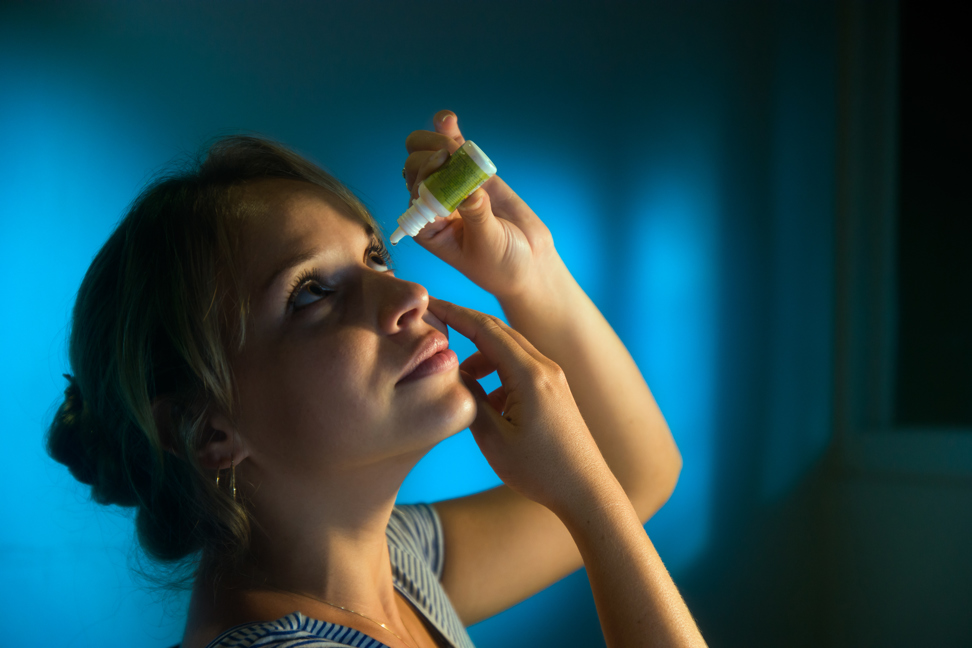
Natural Remedies for Dry Eyes
Natural remedies can also help to reduce dry itchy eyes.
Using a warm compress can help to temporarily relieve symptoms – simply apply a clean washcloth soaked in warm water to your closed eyelids for 5 - 10 minutes. Rubbing your eyes can aggravate the condition and should be avoided.
Vitamins and supplements can help reduce symptoms of dry eye. This includes foods and supplements containing Omega-3 Fatty Acids, which are commonly found in certain fish, flaxseed and chia seed.
If your dry eyes are caused by screen time or extended periods of focusing, carrying out blinking exercises and taking regular breaks can help to keep your eyes lubricated.






